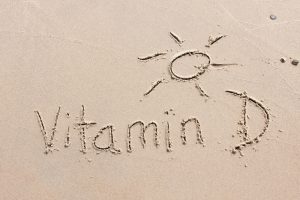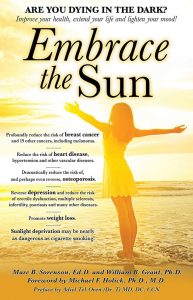Vitamin D, prostate cancer and sunlight By Marc Sorenson, EdD
Vitamin D is a magnificent, critically important photoproduct of sun exposure, sun lamps and sunbeds (tanning beds). It is not really a vitamin, but rather a hormone that controls hundreds of genes in the body. The production of this hormone occurs in the skin in response to UVB light from the aforementioned sources. About 90% of vitamin D blood levels, across the average population in the U.S., occurs through sun stimulation to skin. Supplements and food sources provide only a small amount of vitamin D on average.
Vitamin D and other cancers, including prostate cancer (PC)
There is a close association of high vitamin D levels and lowered risk of breast cancer and many other cancers. Therefore, it seems logical that supplementation might also reduce PC risk. However, it seems like that may not be the case, and it needs further discussion. In fact, vitamin D studies show only weak correlations between vitamin D levels and a reduction in PC. The highest levels of serum vitamin D shows a J-shaped curve, meaning those levels actually associated to a slightly increased risk. No such increase occurs with the highest levels of sunlight exposure–quite the opposite. The highest levels of sunlight associated to the highest levels of protection against PC.
An interesting study on sunlight, vitamin D and prostate cancer.
It was with interest, therefore, that I read a recent article describing the effect of sunlight on PC, called “Sunlight could decrease prostate cancer risk.” After affirming that sunlight exposure could reduce the risk of PC by 50%, the author unfortunately stated, “This does not mean men should deliberately sunbathe to reduce their risk of prostate cancer. Outdoor exercise and an adequate amount of vitamin D from diet should be sufficient to afford protection from the disease.” Yet, this is not a statement based on science, especially considering the J-shaped curve. Thus, the author obviously assumed vitamin D caused the association of sun exposure to reduced PC risk.
Now, let’s talk about some impressive studies on sunlight per se.
Here are some rather interesting studies regarding sun exposure and PC. In addition, there are numerous others discussed in the book, Embrace the Sun. Probably the most stunning paper was one in which researchers used childhood sunburn as a measure of sun exposure. As a result, they determined that men who experienced sunburns as children were protected against PC. Consequently, they had one-fifth the risk of contracting prostate cancer as those who had not sunburned! However, please do not burn!
Let us be careful about our sunlight!
In addition, a note of caution regarding sunburn: I do not recommend that anyone sunburn to prevent prostate cancer. The researchers used sunburn to predict higher vitamin D levels. Yet, sunburn is not necessary to achieve the remarkable results, since non-burning sun is sufficient. Most noteworthy, this research also demonstrated that men with the lowest sunlight exposure had more than three times the risk of prostate cancer. A follow-up to this study was also interesting. Men in the lowest quartile of sunbathing had a 5.3-fold greater risk of prostate cancer compared with men in the highest quartile.
A final thought
One more paper, cited in conclusion. Researchers have stated, “Higher levels of cumulative sun exposure, adult sunbathing, childhood sunburn and regular sunny holidays in hot climates were each independently and significantly associated with a reduced risk of this [prostate] cancer.”
Men, protect your prostate by obtaining plenty of non-burning, regular sun exposure.
For more information on myriad positive sun articles, visit http://sunlightinstitute.org/ and read the book, Embrace the Sun, by Sorenson and Grant.




